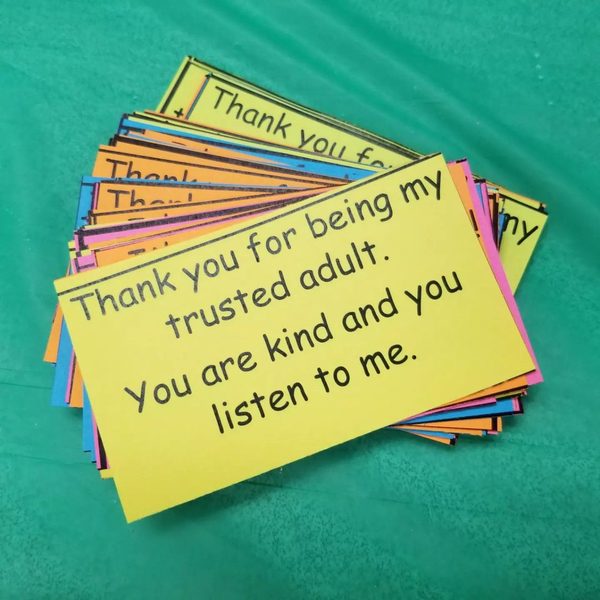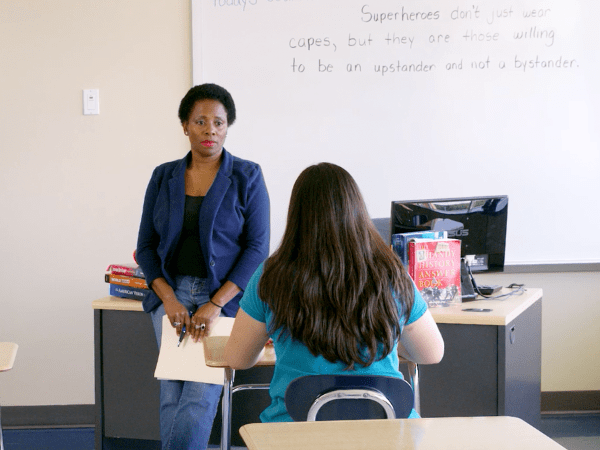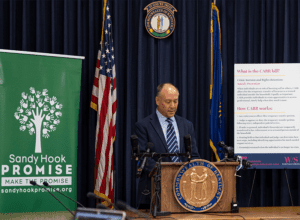Vae Champagne is the Associate Director of Programs at Sandy Hook Promise where she develops curriculum and resources for the Know the Signs programs and the SAVE Promise Clubs. Champagne is a former educator who has more than two decades of experience in youth development and urban education.
Self-Discovery: When I Discovered I Was a Trusted Adult
I couldn’t quite pinpoint a label that defined who I was as a high school teacher. Writing lesson plans, grading papers, and delivering chalk-and-talk lectures is a mythical “teacher” persona. Teachers’ roles ebb and flow from instructor and consultant to therapist, protector, and motivator. It was while working on the Say Something program that it all made sense to me. The third step of the program, “tell a Trusted Adult.” Yes. That’s it. I had been a Trusted Adult!
I left teaching, in part, to deepen my work in the field of Social Emotional Learning (SEL). Experience taught me that the best way to engage a student in learning is through SEL practices and activities. It was why some students not only entered my classroom but really leaned into the work.
They leaned into conversations with peers, readings about current events, and group projects. They felt a sense of belonging to a community based on a web of relationships.
As I look in the rearview mirror, I understand that many students viewed me as a Trusted Adult because SEL was infused into every facet of my class. It wasn’t about just completing assignments in my classroom. It was about growing a whole human.
Who are Trusted Adults?

They are adults working in school and community settings who are a consistent, dependable source of support for youth. Trusted Adults are counselors, teachers, administrators, psychologists, social workers, cafeteria staff, School Resource Officers, bus drivers, janitors, and other adults who interact regularly with school-age children.
They are present. Trusted Adults provide an ear for students and the shoulder for other educators to lean on (a concept introduced by Brooklyn Raney in her book, One Trusted Adult). While we teach students to “tell a Trusted Adult” when issues and warning signs of violence arise, the Trusted Adults must also have a support network readily available.
Trusted Adults are the influencers. They understand the importance of youth agency in building an equitable, inclusive classroom and culture. And they make it look easy and fun!
Building Bonds with Other Trusted Adults
In my role at Sandy Hook Promise, I have the opportunity to meet and learn from educators nationwide. Educators who invest in SEL skill development in their classroom through our Know the Signs violence prevention programs.
I have the opportunity to observe and absorb the experience of teachers delivering the programs. And I use that knowledge to support SAVE Promise Club Advisors who are educating, engaging, empowering, and encouraging youth leaders.
These Club Advisors are Trusted Adults that provide platforms, mentorship, resources, and experiences for their Club members to affect change and shift school culture. They elevate youth voices and connect students with one another.
When Trusted Adults communicate and collaborate with one another, there is deep learning, empathy, and understanding. Trusted Adults are continually sharing stories of SEL program success and struggles, and, through this process, building a tight-knit community.
The bonds that develop amongst Trusted Adults are crucial to longevity in the education profession.
Becoming A Trusted Adult
Sandy Hook Promise’s National Youth Advisory Board members created four steps for being an authentic Trusted Adult for the workshop “Being a Trusted Adult”: (1) Listen (2) Respond (3) Reassure (4) Follow-up. Adult participants are asked who their own Trusted Adults were as students and what qualities they embodied, like being empathetic, non-judgmental, trustworthy, “someone who believes in me,” and good listeners.
As we continue to strive for safer schools and communities, Trusted Adults are increasingly important — for students AND educators. Know the warning signs of potential violence, suicidal thoughts, or self-harm and tell a Trusted Adult when seeing concerning behaviors.
Get started in our Learning Center to access Trusted Adult trainings, resources, and curriculum.


